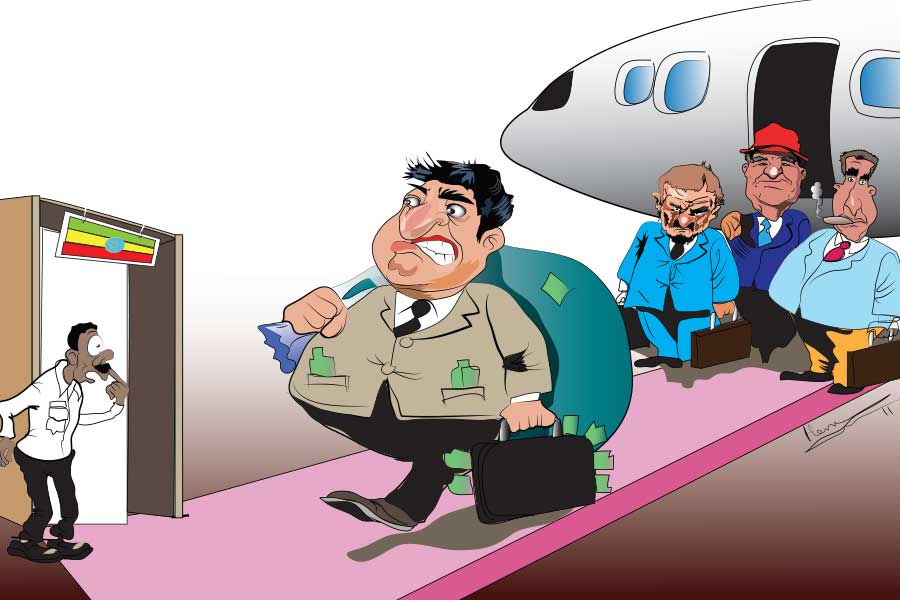
Agenda | Jul 27,2019
Jan 31 , 2021
By Austine Sequeira ( Austine Sequeira is an independent consultant. He can be reached at austinesequeira@gmail.com. )
The World Bank Group (WBG) has released its ritualistic report on global economic prospects recently. Broadly, it talks about the continued effect of COVID-19 and the resulting growth prospects that are projected to be less than encouraging. A number of economists had predicted a “V” shaped recovery in the immediate future; the Group’s report does not indicate this.
Global output is expected to expand by four percent in 2021. These projections are below the pre-pandemic growth figures. Developing economies (EMDEs) are expected to perform below their historical growth figures. A frightening analysis is a 90pc fall in the growth rate of per capita income in their economies, resulting in mass poverty.
There is no doubt that the pandemic has re-drawn the economic exigencies. Policymakers the world over are grappling with resource shortages. The WBG insists on investment in human capital as the key to the revival of developing economies. However, the statistical data reported shows that fiscal expansion through structural reforms is a better option that will indirectly expand human capital investment.
Let us accept that the pandemic is here to stay for at least a year. Rich countries are easily winning the vaccine race in their attempt to arrest the spread of the virus. Developing countries like China and India, on the other hand, have embarked upon the development of low-cost vaccines and other conventional methods. Both strategies have their virtues. Still, the whole exercise puts pressure on resource mobilisation and public spending.
What is the prescription for sustainable growth?
Several African countries have moved from least developed country rankings to emerging and developing economies classification. This very change is putting huge pressure on public spending, resource mobilisation and private investment.
This is in contrast to the economies of the likes of India, Singapore and South Korea that need little or no support from the public sector except sound fiscal policies, because a large part of growth and investment activities are spearheaded by the private sector. The formal services sector in these countries contributes above 50pc to their economies. Informal labour is also well directed and productive to contribute as micro, small and medium enterprises.
These fundamental issues are missing in Africa’s emerging economies. The early 2010s saw a massive increase in public debt and the creation of unproductive assets. It meant lower credit ratings that led the IMF and other multilateral institutions to tighten debt screws. These governments were grudgingly forced to explore hybrid pathways like public-private partnerships (PPP), which do not have a proven record on the continent. Neither were reforms in the service sectors very much on the agenda.
The African emerging economies would have been better today if they had created productive infrastructure to let the private sector grow. Hong Kong, Singapore and India have created vibrant insurance, financial services and technology sector through laws, rules, and regulations driving both manufacturing and the agriculture sector.
Critically, during the pandemic, amid the strictest lockdowns, financial services and technology sectors contributed handsomely to economies and attracted big valuations. Investments in stock exchanges in India supported the lives of the average middle-class during the lockdowns.
African nations, therefore, have to build an economy that enables the creation of multiple sources of income, and this can best be done by having a less interventionist government and a vibrant private sector. The applicable economic term can be summed up in just one word, “reforms.”
In several countries, despite governments ramping up financial support to households to improve aggregate demand, the private sector has a significant part to play.
This is true of India. The country has embarked upon a campaign, “Atmanirbhar Bharat,” which aims to make India self-reliant in several manufacturing sub-sectors. India believes it can do this because of the domestic business structure, which is continuously evolving.
No doubt, there are flashpoints like farmers’ agitation against the latest farm reforms, which could have been handled more delicately. However, India’s democracy is vibrant enough to get past this point and reach a compromise that does not leave anyone behind.
It is easy for the Group to issue advisories to emerging markets to improve domestic revenue mobilisation and prioritise expenditures. Domestic revenue mobilisation purely depends on the income levels of the masses. Countries like Ethiopia have a large informal market where large amounts of cash cannot be used to increase demand, savings, productivity or supply. It is indeed one of the problems it attempted to address when Ethiopia demonetised its Birr last September.
Governments in Africa have to seize opportunities created by the pandemic and unleash service sector reforms that will empower the masses to step into new avenues of income and growth. The public sector balance sheet is a cause of concern from Angola to Ethiopia. It will not endure. Thus, the responsibility for sustainable development must be transferred from the public to the private sector. This will happen only through economic reforms.
PUBLISHED ON
Jan 31,2021 [ VOL
21 , NO
1083]

Agenda | Jul 27,2019

Fortune News | Dec 23,2023

Fortune News | Oct 26,2019

Radar | Apr 06,2019

Viewpoints | Jan 27,2024

Radar | Sep 14,2025

Radar | Oct 31,2020

Radar | Jun 11,2022

My Opinion | Aug 08,2020

Radar | May 12,2024

Dec 22 , 2024 . By TIZITA SHEWAFERAW
Charged with transforming colossal state-owned enterprises into modern and competitiv...

Aug 18 , 2024 . By AKSAH ITALO
Although predictable Yonas Zerihun's job in the ride-hailing service is not immune to...

Jul 28 , 2024 . By TIZITA SHEWAFERAW
Unhabitual, perhaps too many, Samuel Gebreyohannes, 38, used to occasionally enjoy a couple of beers at breakfast. However, he recently swit...

Jul 13 , 2024 . By AKSAH ITALO
Investors who rely on tractors, trucks, and field vehicles for commuting, transporting commodities, and f...

Oct 25 , 2025
The regulatory machinery is on overdrive. In only two years, no fewer than 35 new pro...

Oct 18 , 2025
The political establishment, notably the ruling party and its top brass, has become p...

Oct 11 , 2025
Ladislas Farago, a roving Associated Press (AP) correspondent, arrived in Ethiopia in...

Oct 4 , 2025
Eyob Tekalegn (PhD) had been in the Governor's chair for only weeks when, on Septembe...